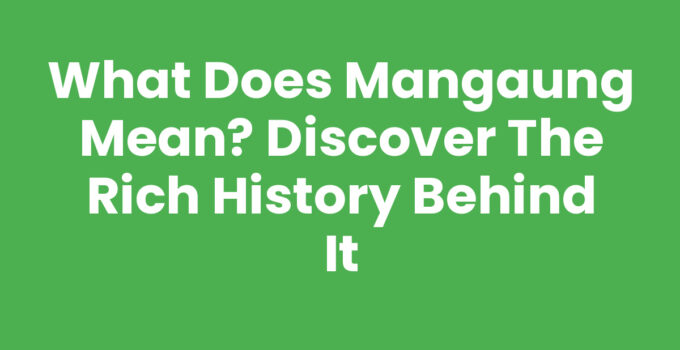Mangaung is not just a name; it represents a culturally rich location with historical depth and significance. Situated in South Africa, specifically within the Free State province, Mangaung is the name of the city that serves as the capital of the region. In the Sesotho language, ‘Mangaung’ translates to ‘place of the hippos’, highlighting the natural heritage and wildlife that once inhabited the area. This blog post will delve deeper into what Mangaung means, the history behind it, and what makes this region unique.
What Does Mangaung Mean?
The term ‘Mangaung’ derives from the Sesotho language, spoken predominantly by the Basotho people in the region. The direct translation of Mangaung is ‘place of the hippos’. This name is a testament to the historical presence of hippos in the Bloemfontein area, where Mangaung is located. Historically, the hippos roamed the rivers and wetlands that characterized this lush environment, serving as a crucial element of the region’s biodiversity.
The city’s name was officially adopted in 1997, reflecting a shift towards recognizing the indigenous languages and cultures of South Africa post-apartheid. The choice of the name Mangaung symbolizes a deeper appreciation for cultural heritage and the significance of the natural environment. This is particularly important as communities strive to reclaim their history and identity in a country rich with diversity.
Mangaung encompasses more than just a city name. It has now become synonymous with governance; it is home to the City of Mangaung Metropolitan Municipality, which oversees Bloemfontein, the capital of the Free State province.
The Historical Context of Mangaung
In order to fully grasp what Mangaung means today, it is essential to explore its historical backdrop. Long before it became a prominent metro, the area was inhabited by the San people and later by the Basotho. The land played a significant role in the cultural and social evolution of these communities. It witnessed early encounters with European settlers and became a center for trade, governance, and education over the centuries.
During the colonial period, Bloemfontein was established as the capital of the Orange Free State, with Mangaung serving as a critical area for agricultural development. The name’s alignment with the native language marked a significant return to recognizing indigenous cultures amidst colonial influence.
In the late 20th century, the shift towards democratization in South Africa resulted in the renaming of many places to reflect their original inhabitants’ languages and cultures. Mangaung’s official naming is part of this broader movement, honoring its linguistic and cultural roots.
You Might Also Like: Discover Deane Avenue, Bloemfontein: Your Ultimate Guide
Cultural Significance and Current Day Mangaung
Mangaung plays a vital role in South African culture, celebrated through various festivals, educational initiatives, and community programs designed to promote the history and heritage of the region. The phrase ‘place of the hippos’ brings with it stories and traditions that are integral to understanding the identity of the Basotho people and their connection to the land.
Today, Mangaung is not only about its historical significance but also about its role as a contemporary urban center. It boasts several points of interest, including cultural hubs, educational institutions, and thriving economic areas. It is also recognized for its efforts in wildlife conservation and education, aiming to preserve the species that once inhabited its waterways.
The vibrant cultural scene in Mangaung features local artists, traditional crafts, and music, which showcase the rich heritage of the area. Additionally, sports play a pivotal role, with stadiums and facilities making Mangaung a centre for important events that contribute to national pride.
For visitors and locals alike, understanding what Mangaung means provides insight into the beautiful yet tumultuous history of South Africa. It is an invitation to engage with the landscape, encouraging exploration not only of the city itself but its stories. When one walks the streets of Mangaung, they are walking through layers of history, identity, and resilience.
You Might Also Like: Explore the Fresh Produce Market Bloemfontein for Local Delights
Conclusion
Mangaung serves as a powerful reminder of the importance of languages and cultural heritage in shaping a community’s identity. The name reflects the historical presence of hippos, the indigenous people’s connection to the land, and a newly established civic identity in contemporary South Africa. As we navigate further into the 21st century, understanding the meaning of Mangaung fosters respect for the past and hope for the future.
Related Guide: Discover the Best Farm Stalls Near Bloemfontein for Fresh Produce
Frequently Asked Questions
What does the name Mangaung represent?
The name Mangaung means 'place of the hippos' in Sesotho, reflecting the area's natural heritage.
Why was the name Mangaung adopted?
Mangaung was adopted in 1997 to honor and recognize the indigenous cultures and languages of South Africa.
What role does Mangaung play in South Africa today?
Mangaung is the capital of the Free State province and serves as a key cultural and administrative hub in South Africa.



